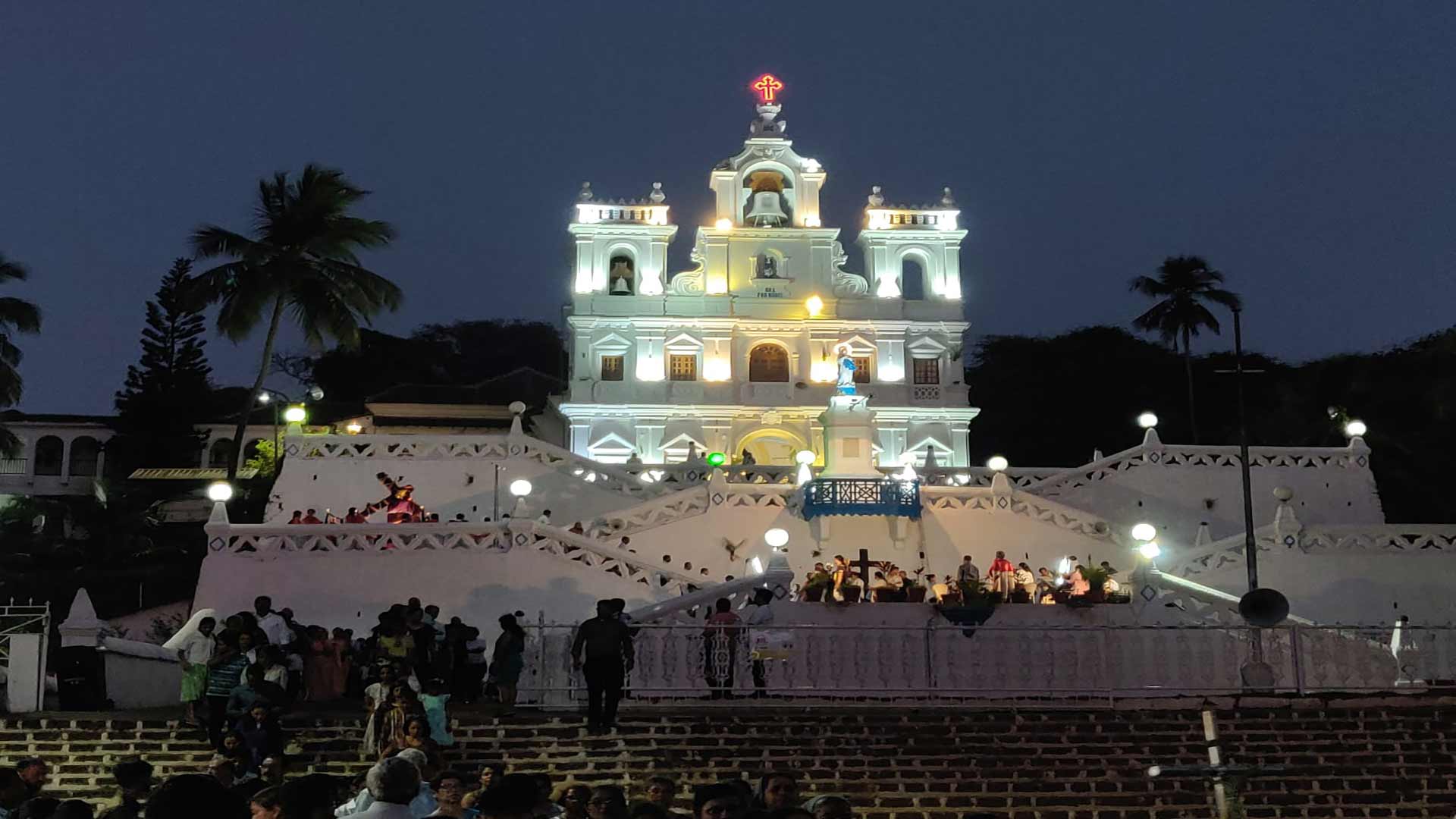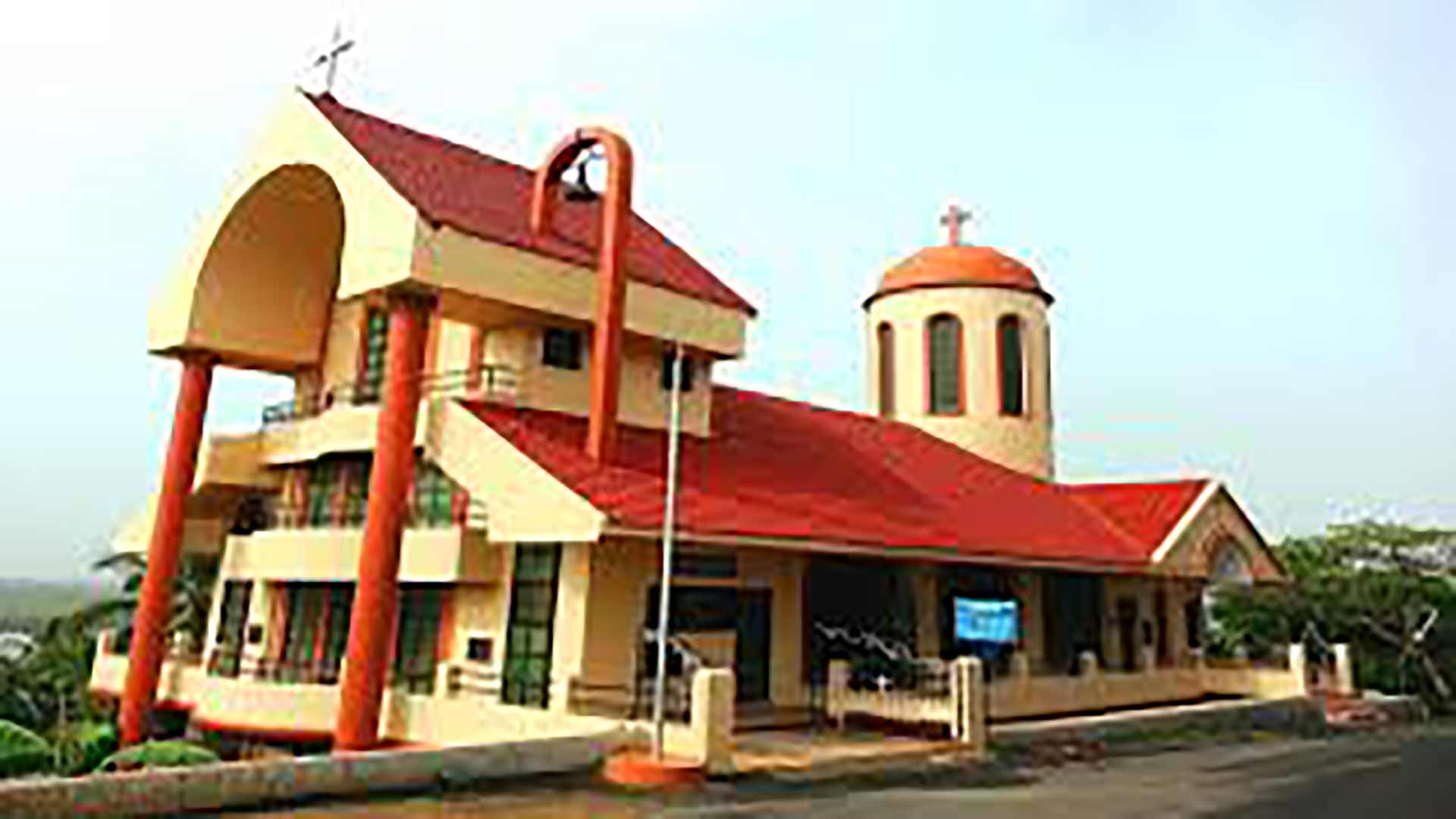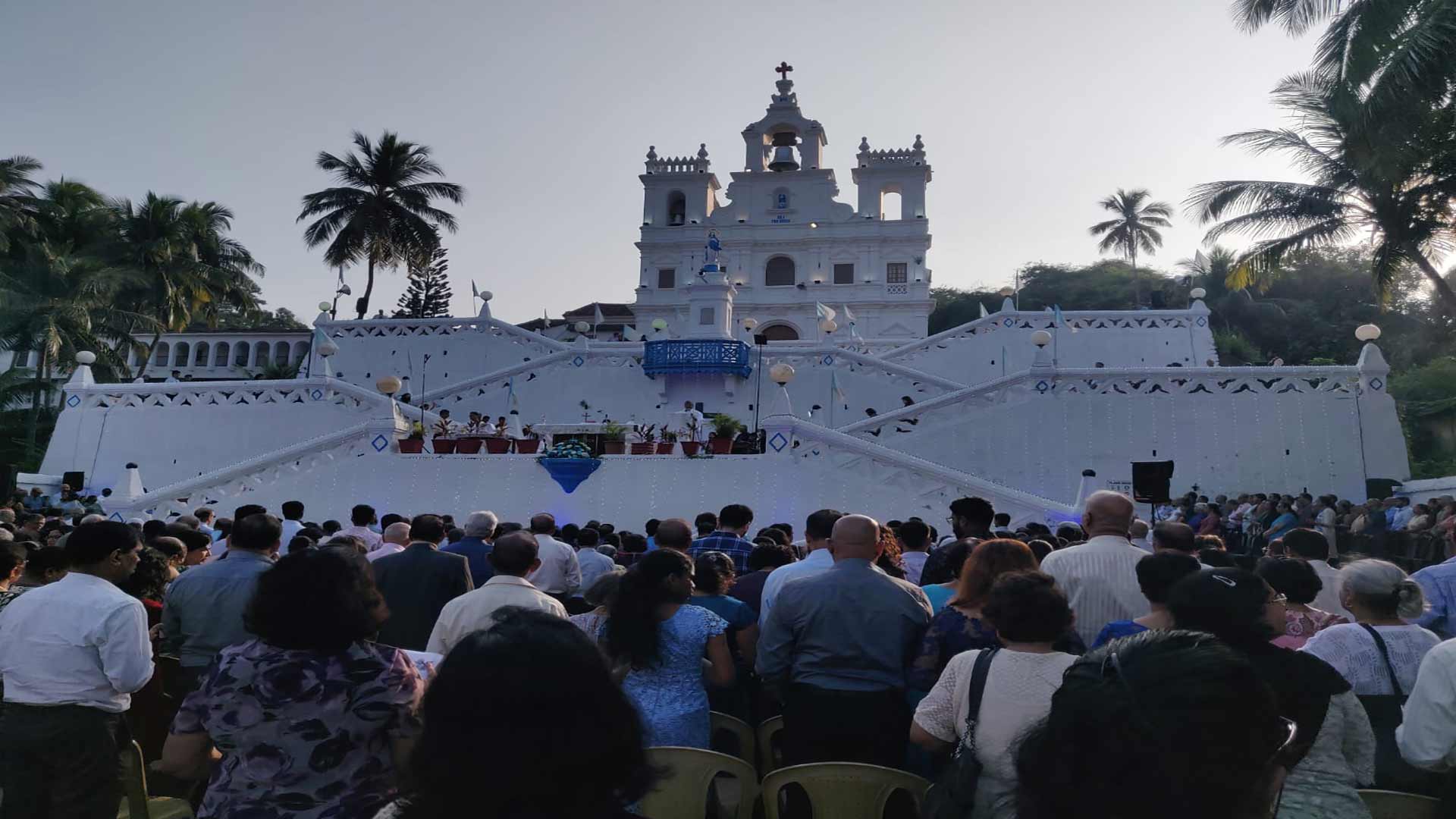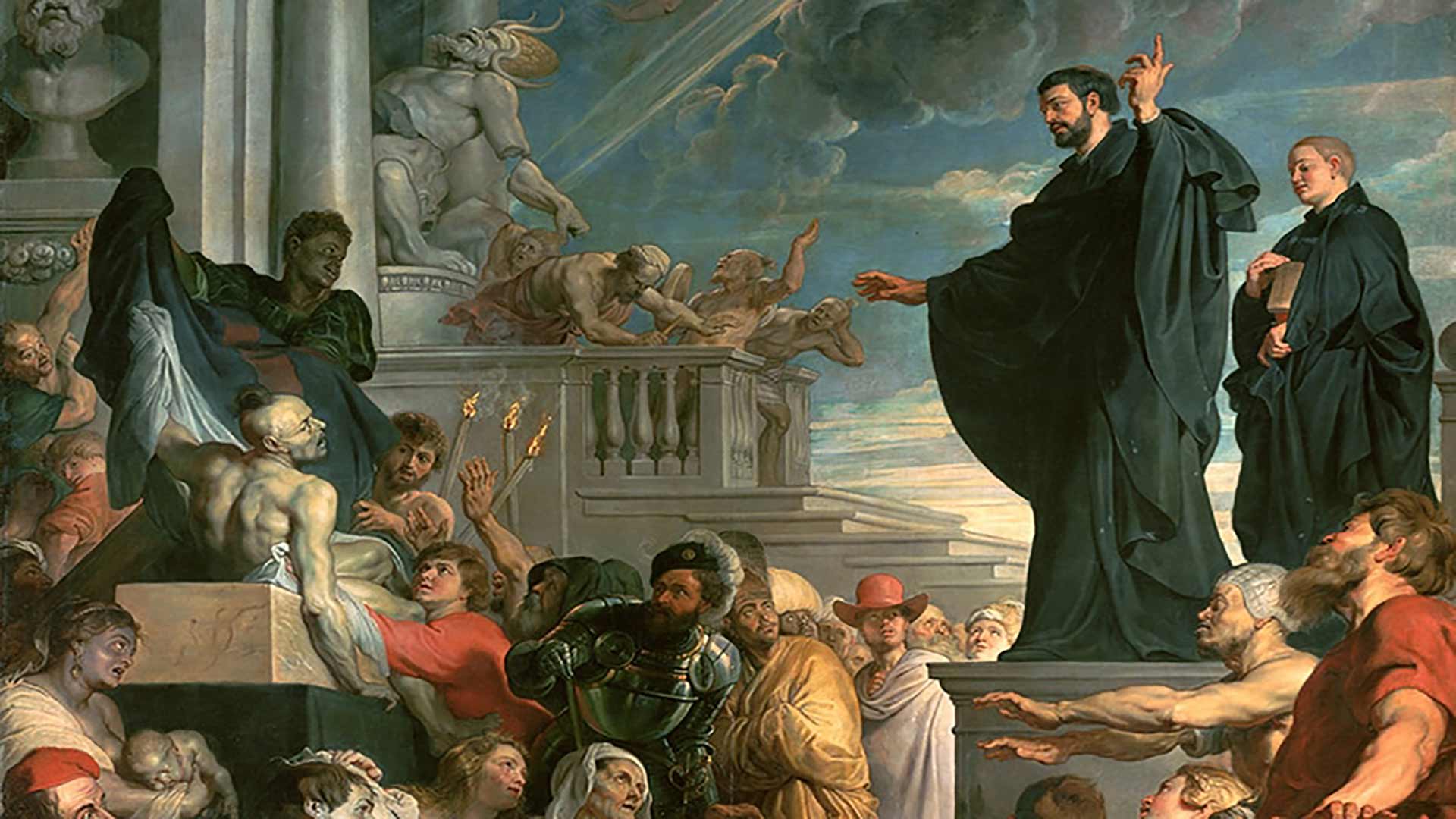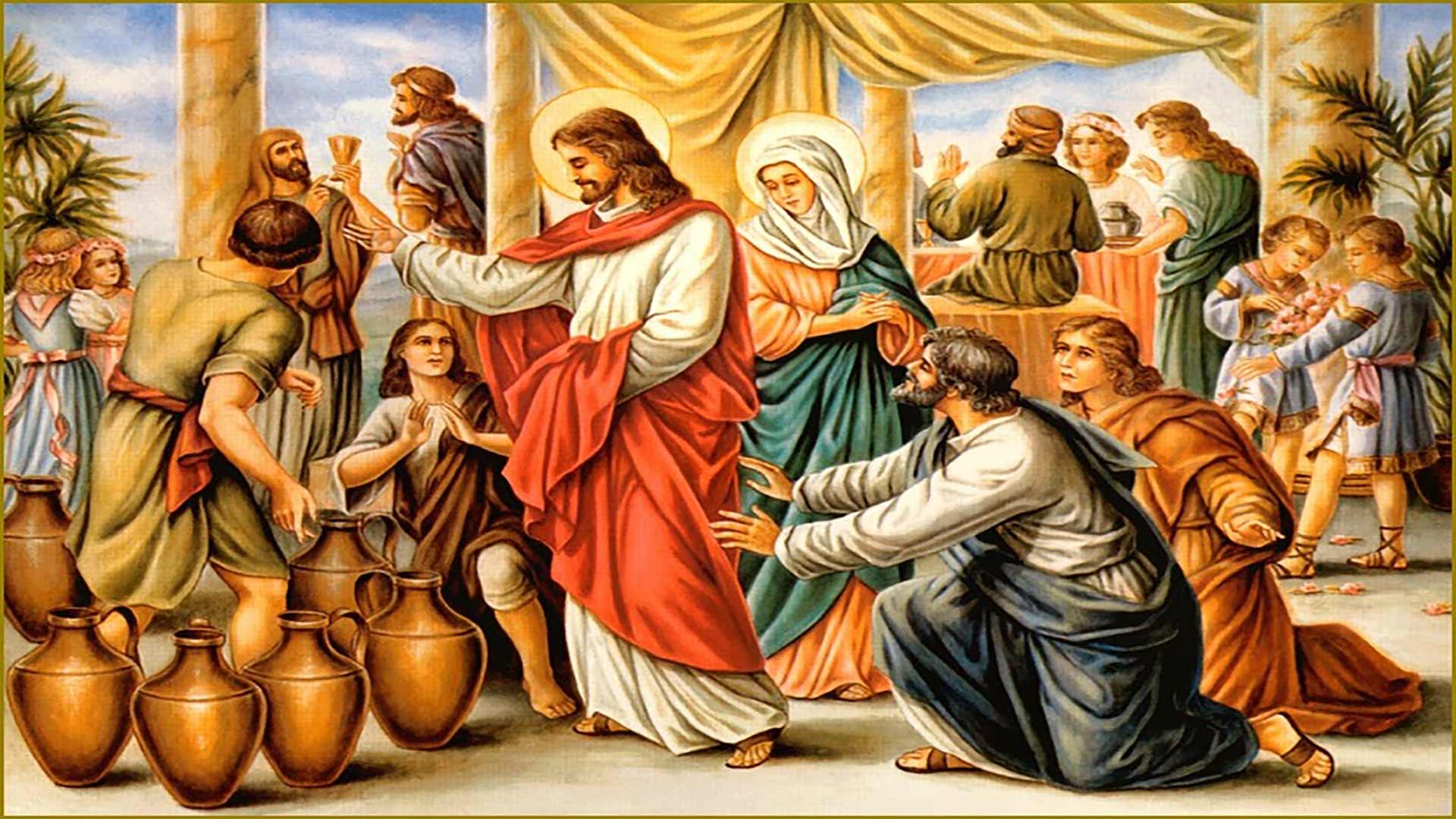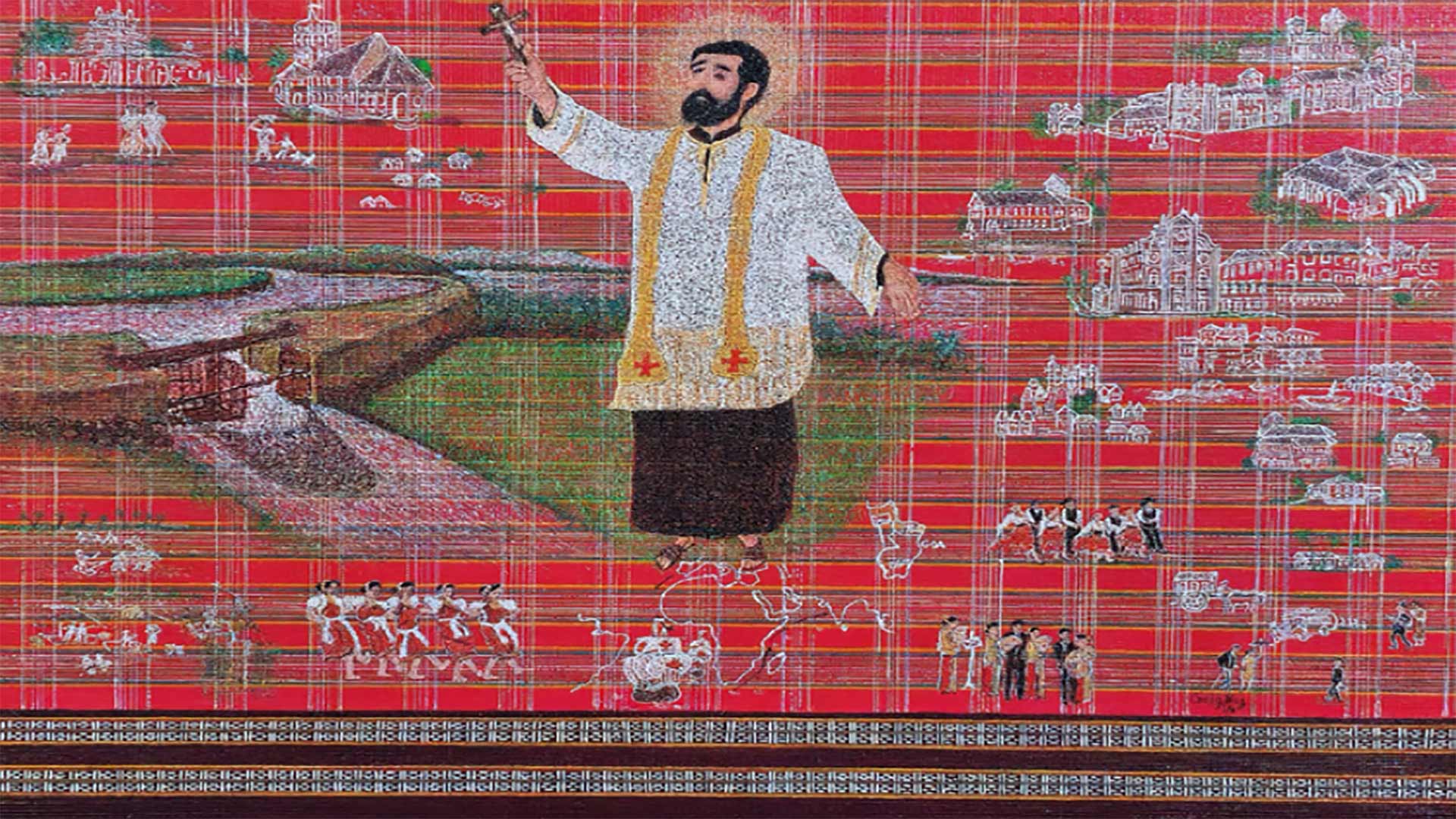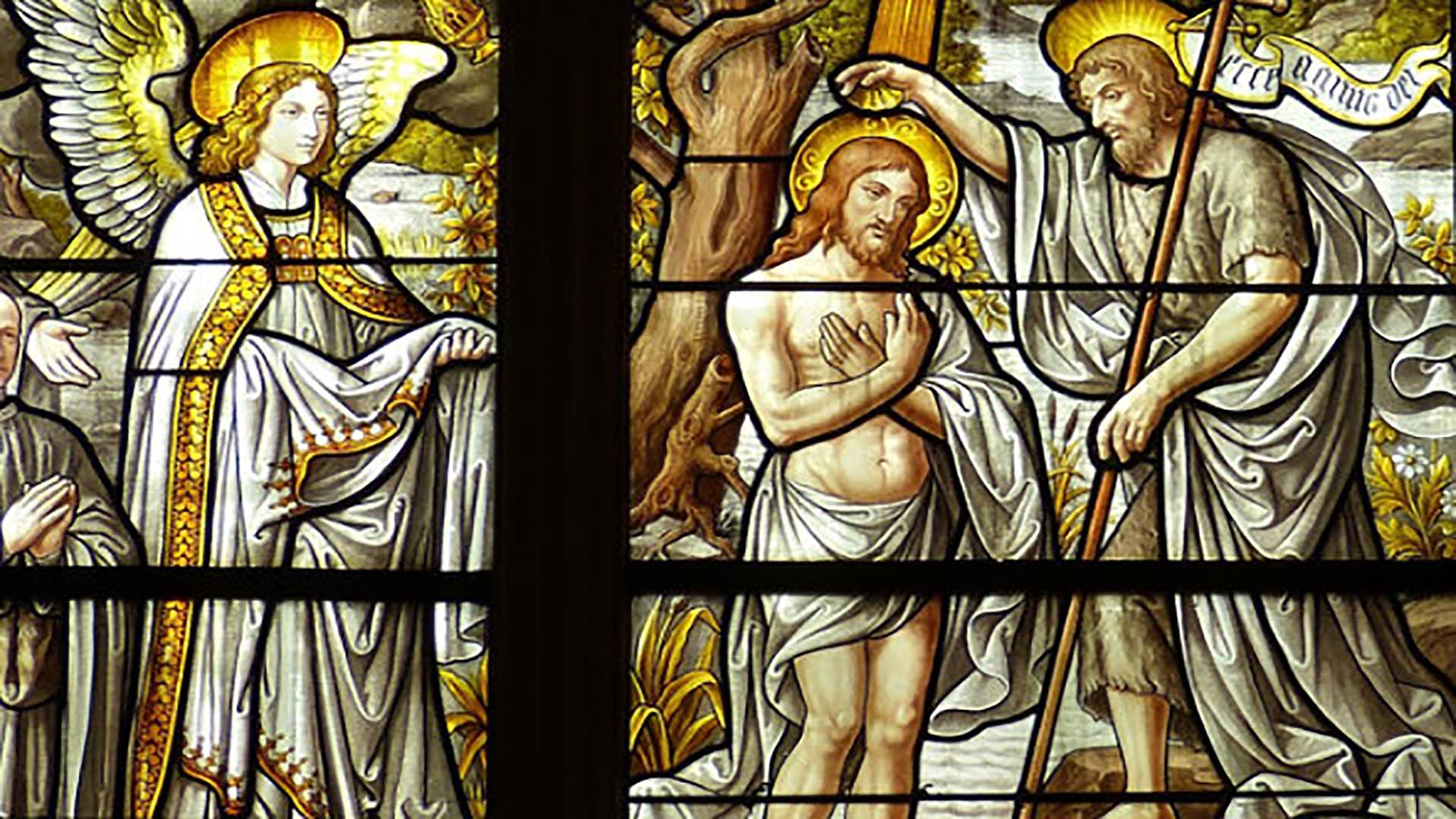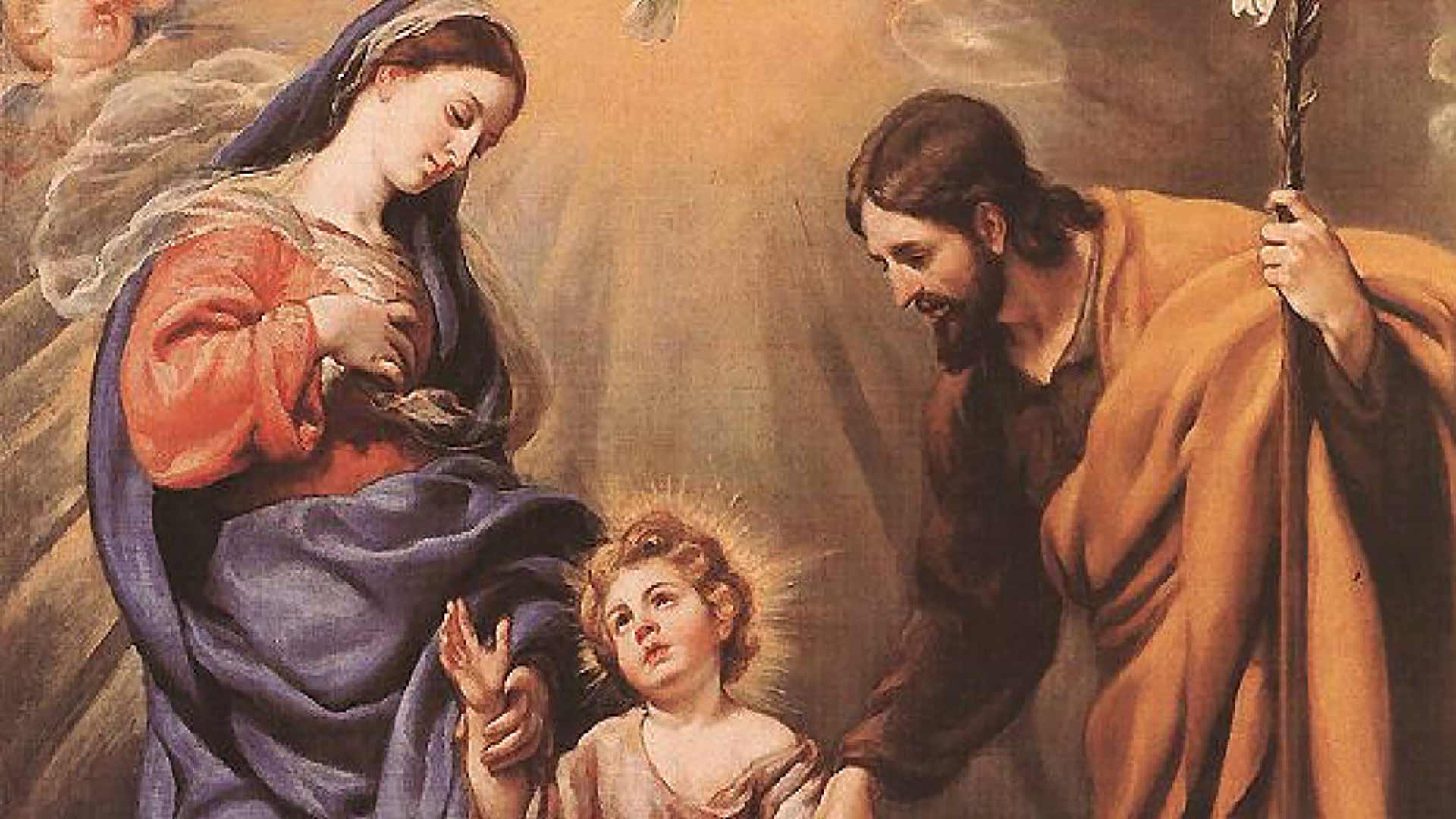Holy Passion Processions in Panjim
At the Church of the Immaculate Conception – the Igreja Matriz or main parish church of Panjim – the sixth Sunday of Lent begins on a festive note. It is Palm Sunday, which commemorates the triumphant entry of Jesus in Jerusalem.
However, after the morning Masses, there is a visible change in the mood, especially with the unveiling of the tableau in the chancel: a larger-than life-size statue of Christ carrying the Cross. Hence, the day's alternative designation: Passion Sunday.
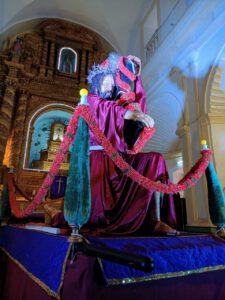
The evening of Passion Sunday features a solemn procession that begins from and ends at the iconic church. It is the highpoint of the Santos Passos (‘Holy Steps’) held on the first five Sundays of Lent, highlighting some of the most intense moments of Christ’s Passion leading to Calvary: the Agony in the Garden of Gethsemane; the Arrest of Jesus; the Flagellation at the Pillar; the Crowning with Thorns; the condemnation by Pontius Pilate (See my blogpost https://www.oscardenoronha.com/2019/03/17/santos-passos-in-panjim/ ). Other churches in Goa do not necessarily have the same set-ups (See https://www.oscardenoronha.com/2021/03/21/lenten-traditions-in-goa/ ).
Passion Sunday signals the beginning of the Holy Week. The predominant colour is purple; the altars are bare and there is not a flower arrangement to be seen. After the evening Mass, a procession called Cruz às costas – the same tableau of Jesus carrying the Cross – wends its way through some of the main thoroughfares of the capital city: the Church square, a section of 18 June, Pissurlencar, past Azad Maidan.


Confrades (Church confraternity members) wearing opa e murça (a red and white cape) carry the statue concertedly, giving the impression that it is floating on its own power. In the past, a brass band would follow; but nowadays, a choir sings from an intermediate landing of the church's zigzag stairway. The singing and prayers are heard throughout the route via funnel loudspeakers. The procession is animated by the recitation of five Sorrowful Mysteries of the Rosary until the end of the procession.
The circuit is marked by over ten descansos (halts), at which points the faithful flock to kiss the statue. A major halt happens at the Capela da Conceição (Chapel of the Immaculate Conception). Built in 1823, it was once a private chapel attached to the mansion of Dom Lourenço de Noronha, scion of a Portuguese noble family, and was later bequeathed to the Confrarias of Panjim church and has been under repairs since 2019.
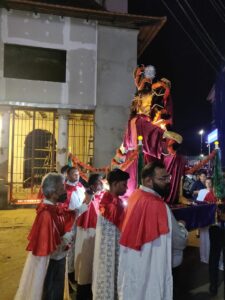


The cavalcade then proceeds via M. G. Road and Dr D. R. de Sousa, past the Garcia de Orta Garden, and up to the church square. Here, at the foot of the stairway, Jesus is met by His Blessed Mother. Sorrowing over her Son so unjustly accused and made to carry the Cross to His death, she accompanies him on his last last legs, as she did two thousand years ago to Golgotha.
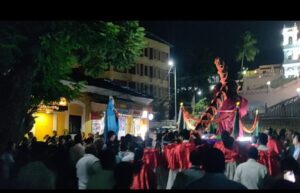
Soon thereafter, the two statues halt on the intermediate landing in front of a large cross carved out of the wall. A level higher, from a pulpit-like balcony jutting out of the said wall, a little girl unrolls the Veil of Veronica while she sings the traditional narrative. This is about the meeting of the legendary woman (feast day, 12 July) with Jesus. As recorded in the fourth station of the Via Crucis (Way of the Cross), Veronica, moved by the sight of Jesus carrying the Cross, wiped his brow with her handkerchief only to find a lasting imprint of his holy face on the cloth.
Thus ends Passion Sunday and preparations begin for the Holy Triduum beginning on the evening of Maundy Thursday. This day, which comprises a Mass with the reenactment of the historic Washing of the Feet by Jesus, marks the institution of the Eucharist and the Priesthood and the proclamation of the Commandment of Love. There is no public procession.
Five days later, on Good Friday, the processional arrangement is the same as on Passion Sunday, except for a few obvious differences.
The poignant Crucifixion tableau opens in the chancel at 3 o’clock in the afternoon. It is interesting how by then the sky is usually cloudy and the mood sombre. The liturgy of the Word and the Eucharist continue until at about half past five. Then, a procession of a larger-than-life-size statue of Senhor Morto (The Departed Lord) placed on an andor (black canopied wooden platform) starts off, with the statue of Our Lady in trail.
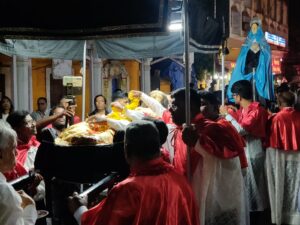
There are some other differences too. Today, the faithful are in funereal attire, which once upon a time was de rigueur. And instead of the sanctus bell, we hear the matraca or wooden rattle at every halt in the procession.
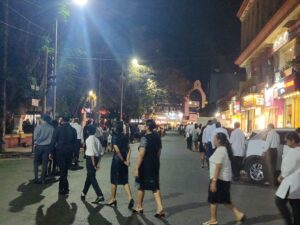
A major difference between the Passion Sunday and the Good Friday procession lies at their very end. This time round, in a coda to the baroque event, is the Sermão da Soledade de Maria (Sermon on the Solitude of Mary) delivered by a priest from the same pulpit-like balcony. The preacher extols the virtues of Mary and highlights her present solitude. Formerly, rhetoric played a crucial role on such occasions, helping to fully engage the congregation. Nowadays, the limited number of faithful who stay on to listen are easily distracted, not least by vehicle noises that detract from the solemn ambience.
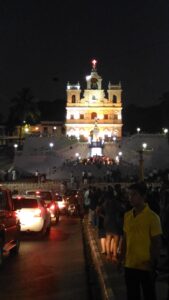
In this context, one striking similarity between the processions is that both are watched in awe by people of other religions. On both occasions, residences put up decorative lights, candles or oil lamps in homage to Our Lord. Some non-Christian establishments remain open, it being a weekday, do the same. People from other religions watch in awe, including policemen (one of whom I saw standing at attention and saluting the Departed Lord). Particularly interesting is the case of the Caculos and the Neurencars, two Hindu families on Pissurlencar Street; they traditionally offer garlands of xenvtim or abolim.
Depending on the number of attendees, the pious, kilometre-long march and related ceremonies on both days take between 75 and 90 minutes. The statues return to the church for concluding rites and veneration. By 8 o’clock, they call it a night!
Behold two processional events in Panjim that have left a lasting imprint on my mind. So was it when my life began; so is it now I am a man. So be it when I grow old – for this ancient tradition is without a doubt one of the most moving spectacles in the religious and cultural calendar of my city, Panjim.
Requests:
1- In the comments section below, do share snippets of similar traditions in your village or city, and document them whenever possible.
2 - Do watch my video titled "Passion Sunday Procession in Panjim", on http://www.youtube.com/@oscardenoronha
From Carnaval to Carnival
| To the Anglo-Saxons, ‘Carnival’ is a travelling fair or circus; to the Latins, or say, the Portuguese, Carnaval is a period of enjoyment or euphoria before Lent. Despite this Christian reference, Carnaval is far from being a religious festival. It is a cultural remnant from pre-Christian times, when the orgiastic Saturnalia was celebrated with tableaux in Rome and Athens.
The festival came to Goa via the Portuguese. At first they used the word Entrudo, of which Intruz is now a Konkani corruption. But given that Entrudo means ‘introduction’ one wonders how epicurean delights can ever be a good introduction to the austerity of Lent! For that matter, the word Gordo, as in Sábado Gordo (Fat Saturday) probably referred to people’s overeating and drinking. As a child, the expression brought to mind those silly, larger-than-life characters that walked the streets on the days of Carnaval. Of course, nowadays, it is the fat profits that the season brings in that better justify the use of the word! In town and country Although in Goa Carnaval and Intruz are sometimes used synonymously, locals know the difference: the former is city-based, cosmopolitan, sophisticated, while the latter happens in the countryside and has a plebeian feel. Anyway, revelry begins on Saturday afternoon and ends on the eve of Ash Wednesday. The festive atmosphere is more pronounced in the Old Conquests, where the Christian presence is larger; and the celebrations in the towns are noisier than in the villages. I remember my grandmother’s take on her childhood Carnaval in Pangim way back in the 1910s. Although it was marked by a lot of tomfoolery, ‘that fun was free of malice,’ she said. No doubt, there was a method to the madness of those who took to the streets in bizarre attires. They shook out talcum powder tins on friends and acquaintances, or used aluminium tubes to spray them with scented water. Youngsters – especially Lyceum lads staying in Repúblicas (hostels) – and the descendentes or mestiços, delighted in burning firecrackers or drenching passersby.[1] The city elite living around Garcia de Orta Garden Square, and families from elsewhere, went round in horse-drawn carriages and engaged in mock battles using confetti or streamers. In those days, even the governor-general played cocotes (paper cartridges containing white powder or coloured sawdust). In the 1930s, the city clubs were known for their soirées and Japanese matinées. These were informal gatherings – and ‘Japanese’ because, artist and Carnaval enthusiast Alfredo Lobato de Faria once told me,[2] Goa was then flooded with dainty Japanese products that they used on the occasion. The parties were held at Clube Nacional, which had a large ethnic Goan membership; at Clube Vasco da Gama, which was the bastion of Europeans and their hangers-on; or at the short-lived Clube Recreativo that the city merchants had set up. Such events helped the old and the young alike to unwind as they made music with family and friends; but the very pleasure of partying is said to have disappeared after World War II. In his coffee-table book titled Goa, Mário Cabral e Sá says that “Carnaval in Goa was a great leveller. Early accounts – all of them hearsay – are indeed educative. The white masters masqueraded as black slaves, and the latter – generally slaves brought in from Mozambique – plastered their faces with flour and wore high battens or walked on stilts. For those three ephemeral days, they were happy to be larger than life. And while the ‘whites’ and the ‘blacks’ mimicked each other, the ‘brown’ locals watched this reversal of roles in awe from the sidelines.”[3] The spirit of the season in our cities, towns and villages is still marked by friendly exchanges. People mix freely in a riot of colour. Way back, folks made cardboard masks and hats, covered them with tinsel, and launched assaltos (mock assaults), that is, surprise visits to friends’ houses, amusing the household and frightening unwary passers-by with their antics. Boys used chiknollis (bamboo syringes) or plastic tubes and guns, to spray coloured powder; and they painted girls’ faces, just when they least expected it, and seized the opportunity to confess their love! The village dramatist was a typical Intruz figure who spun humorous anecdotes and weaved a social critique at the itinerant khell (Konkani theatre play) with song and dance. The Kunnbi and Gauddi lot, presently free from agricultural tasks, were glad to perform, be it in the shade of a tree, in the balcony of a vacant house, or at the local bhatkar’s. One could watch them in Curtorim and Margão’s Gogol ward.[4] In fact, every village in Goa has its own little Carnaval or Intruz. The picturesque island of Divar is known for the Potekar festival.[5] And in Village Goa,[6] Olivinho Gomes describes Chandor’s mussoll-khell, a pre-Portuguese dance-theatre that has evolved down the ages. However, in the last five decades the spotlight has been on a single event – a state-sponsored parade held in Panjim and other towns.[7] The show draws thick crowds from every nook and cranny, but, unlike in the past, they now come as mere spectators, hardly inclined to participate spontaneously. Carnaval vs. Carnival It is difficult to say when Carnaval entered the Goan cultural calendar. What is well known, however, is that when the UN declared 1967 as International Tourist Year, with the slogan ‘Tourism, Passport to Peace’, Percival Noronha, a senior official of the Goa government, conceived the idea of the city parade that is held today, with King Momo announcing his reign of fun. The plan was executed by Vasco Álvares, long-time Chief Officer of Panjim Municipal Council, supported by his sons Manuel and Roberto, Francisco Martins, and others.
Timóteo Fernandes, another aficionado, was the first King Momo. The tableaux attracted tourists and locals alike. Hoping to take the show to another level, the government approached liquor and hotel industries, and their funding has since become indispensable. Clube Nacional’s Red & Black Dance held on Panjim’s main artery was the rage, and like Margão’s Harmonia and Bernardo Peres da Silva club balls, raked in a lot of money. No doubt, organising fancy dress contests, arranging costumes and decorating the venues was not kid’s stuff; it called for brainstorming and research, physical effort and coordination. But eventually it became a whole new ball game. That is how and when the traditional Goan Carnaval turned into a new-fangled, commercial Carnival. Of the old-style festival, only the slogan remained: ‘Viva Carnaval!’; its soul had vanished into thin air. With the cultural agenda thus commercialized, the festival was stripped of its simplicity and spontaneity. Those who have seen it evolve say that the comic element gradually crossed the limits of decency – and turned garish and tragi-comic! In the 1980s, the Church in Goa denounced the use of indecent attires, intoxicants and drugs under cover of Carnival. In 1987, people boycotted the festivities, protesting the delay in recognizing Konkani as Goa’s official language. The State machinery revived the festivities in the 1990s, but Carnival-weariness had already set in. Disgruntlement left a mark, at least by way of veiled messages that the floats displayed. Even so, the Carnival bandwagon has moved on, fuelled by money, feni and more. It stations itself at Garcia de Orta Garden Square, specially renamed ‘Samba Square’ for the season. There are food and liquor stalls, music, dance and revelry galore, but missing is that authentic spirit of Carnaval… In a bid to draw attention to the only Latin festival in an Indian setting, why conjure up a picture of Brazil? All one had to do was change ‘Carnival’ back to our very own Carnaval! |
[1] Fernando de Noronha, Goa tal como a conheci. Goa: Third Millennium, 2018, p. 129.
[2] See Alfredo Lobato de Faria’s interview on Renascença Goa, https://www.youtube.com/watch?v=q3ylH2bkNzA
[3] Mário Cabral e Sá and Jean-Louis Nou, Goa. New Delhi: Lustre Press, 1986, p. 44
[4] Cf. Vince Costa’s short film titled ‘Chotrai, khellpolloinarank chotrai’, https://www.youtube.com/watch?v=q3ylH2bkNzA
[5] Celina de Vieira Velho e Almeida, Feasts and Fests of Goa: The Flavour of a Unique Culture. Panjim: Self-published, 2023, pp. 24-27.
[6] Olivinho Gomes, Village Goa. New Delhi: S. Chand & Co., 1996, p. ___; Zenaides Morenas, The Mussoll Dance of Chandor. Goa: Self-published, 2002.
[7] Carnival 2025 I Doordarshan Goa I Live Telecast of the Panjim Carnival Parade, https://www.youtube.com/watch?v=Nnvgbl-Sc_U
An Enigma called 'Padre Álvares'
BOOK REVIEW | Óscar de Noronha
Saint Alvares Mar Julius, by George K. Kurian. Goa: St Mary’s Orthodox Syrian Church, 2013. Pp 168. ₹ 80.
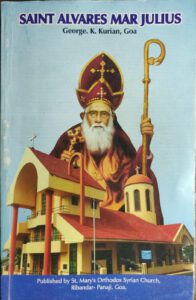 It does not seem like there is anyone today who has known him personally, for he died over a century ago. Furthermore, those who did, in a not-so-distant past, usually spoke of him in hushed voices, given his anti-establishment posture. However, even his severest critic would admit that he had a heartbeat for the voiceless in Goan society.
It does not seem like there is anyone today who has known him personally, for he died over a century ago. Furthermore, those who did, in a not-so-distant past, usually spoke of him in hushed voices, given his anti-establishment posture. However, even his severest critic would admit that he had a heartbeat for the voiceless in Goan society.
Born António Francisco Xavier Álvares (Verna, 1837 – Ribandar, 1923), he studied at Rachol Seminary and was ordained a priest in Bombay (the episcopal chair in Goa was vacant). On his return, he set up a charitable society to rehabilitate beggars (some of whom lodged with him in his rented apartment in Panjim) and a church-aided school. Quick to reach out, especially when deadly epidemics raged in the capital, he once personally saved labourers trapped in a landslide triggered by hill cutting.
However, George K. Kurian’s book focuses on the unprecedented entry of a Roman Catholic priest into the Malankara Orthodox Syrian Church. Until his early public years Fr Álvares was a conservative and loyalist to the point of defending Portugal’s Padroado rights; what then was really the tipping point?
Kurian points a finger at Archbishop António Sebastião Valente’s objections to the tenor of Fr Álvares’s writings (pp 53, 81), but stops short of identifying the genesis of his unease, which predated Valente’s arrival. Over a period of 18 years (1877-1895), the cash-strapped Fr Álvares came to be associated with a number of periodicals (A Cruz; A Verdade; O Progresso de Goa; The Times of Goa and Brado Indiano), in different capacities. Whether or not his politically minded associates and/or funders rode piggyback is another matter.
Similarly, the author refers to Fr Álvares’ excommunication (pp 75, 158), but provides no proof. Did it precede or follow his entry into the Malankara church in 1887? The penalty would depend on the circumstances of the case. That’s not all. Fr Álvares was also instrumental in forming the Independent Catholic Mission and the Brahmavar Mission in Karnataka: a response to the Padroado-Propaganda Fide imbroglio?
The rest is history. In 1889, Mar Dionysius, who headed the Malankara church, appointed Fr Álvares to a specially created episcopal post of Metropolitan of Goa, India (excluding Malabar) and Ceylon. Titled ‘Mar Julius’, he still said Mass in Latin (his Syriac and Malayalam were not up to par), catering to the Indian Orthodox Church’s Roman Catholic lay entrants, who were permitted ‘a separate rite and liturgy’ (p. 62). He highlighted the antiquity and authenticity of Antioch vis-à-vis Rome (p. 91) and was critical of Western cultural practices in vogue in Goa as against the preferential status accorded to Indian traditions in Malabar (p. 54).
In the period 1887-1911, Fr Álvares divided his time between Ceylon, Kerala, Brahmavar, and Goa (pp 63, 71). In 1890, the police in Goa booked him for unauthorised use of ecclesiastical vestments (p. 111), but the court, taking due cognisance of his episcopal status, acquitted him. On a later visit to Goa, he championed the use of indigenous products (‘a forerunner of the great Swadeshi Movement’, p. 95) and found himself in a spot for denouncing the rulers. Ultimately, he was charged with sedition and arrested for his writings that had allegedly incited the Maratha sepoys and Ranes (p. 113). He was exonerated, and this spoke volumes about the justice delivery system; but Fr Álvares fled Goa yet again, fearing reprisals.
In 1911, Fr Álvares was at the receiving end of a feud between the Patriarch of Antioch and Mar Dionysius (p. 87). Excommunicated for siding with the latter, it was as if life had come full circle when he relocated to Goa and stayed in the same old, ground-floor apartment off Ourém Street. The big difference in Portuguese India now was that the Republicans were in power; but was this why the Malankara archbishop left his domain in Karnataka?
It would be interesting to know Fr Álvares’ thoughts on that secular (read anticlerical) regime, other than that he was left in peace. This time around, he set up an English-medium school and made a plea for primary education in Konkani (p. 78). In the past, his booklets on cholera treatment were well-timed; presently, he wrote on Goa’s food production, advocating the large-scale cultivation of manioc. Then, engaging exclusively in charity work, he went out with a begging bowl.
Not surprisingly, the longest of the book’s 18 chapters is titled ‘A True Missionary’; it covers Fr Álvares’ apostolic work, his associates and the expansion of the Malankara church in India and abroad. The last few chapters describe the last days of this ‘martyr and saint’ (popularly declared); his funeral; long-standing friendships; his tomb at St. Inez Cemetery; and the formation and work of the Orthodox Church in Goa. Kurian notes that attempts to win Fr Álvares back to the Roman Catholic Church were in vain. The dying priest insisted that if not the Orthodox Church, his friends alone would bury him (p. 118).
Retired bureaucrat George K. Kurian’s self-published volume, which he wrote originally in Malayalam, is a work of love. The biography features an Álvares family tree, in addition to photographs of the subject and of dailies Diário da Noite and O Heraldo that covered the funeral and aftermath. While the topic is intriguing, more rigorous editing would enhance its clarity and coherence. Instances of repetition, typos and grammatical errors detract from the overall reading experience. Overall, the book provides leads that will help researchers better understand the enigmatic figure of Padre Álvares/Mar Julius.
Beauty of being Church
The Readings of the Third Sunday of the Year provide important insights into two momentous beginnings: one, the great religious reform introduced by Nehemiah, with the help of Ezra and the Levites, in the First Reading (Neh. 8: 2-6, 8-10); and the other is Jesus’ teaching ministry, which gave birth to Christianity, in the Gospel (Lk 1: 1-4; 4: 14-21).
Nehemiah was a Jewish leader, and later governor, who supervised the rebuilding of Jerusalem (mid-5th century BCE) after the release of the Jews from their exile in Babylon. The Book of Nehemiah, partly based upon his memoirs, was later put together by an anonymous writer, who apparently also compiled the books of Ezra and the Chronicles.
Nehemiah introduced moral and liturgical reforms in rededicating the Jews to Yahweh. In today’s passage, we see the zealous public imparting of the knowledge of God to people of goodwill. The assembly thus gathered served as a model for the religious life of the Jewish community.
About the Sabbath, governor Nehemiah, the priest and scribe Ezra, and the Levites[1], taught the people: ‘This day is holy to the Lord your God; do not mourn or weep.’ The people wept tears of repentance for their earlier misdeeds. While they were then encouraged to rejoice in the Lord and be happy, it was not solely about partying (‘eat the fat and drink sweet wine’) but about partaking of the neighbours’ misfortunes as well (‘send portions to him for whom nothing is prepared’).
In a close parallel, Jesus preaches in the synagogue of Nazareth. After His Baptism, He had ‘returned in the power of the Spirit into Galilee, and a report concerning Him went out through all the surrounding country.’ When He was given the Book of Isaiah to read aloud from, behold the passage He found when He opened the Book:
‘The Spirit of the Lord is upon me, because He has anointed me to preach good news to the poor. He has sent Me to proclaim release to the captives and recovering of sight to the blind, to set at liberty those who are oppressed, to proclaim the acceptable year of the Lord.’
If this Old Testament passage, like many others, is not an allusion to Jesus, what is? When Jesus closed that book, the eyes of all in the synagogue were fixed on Him. And Jesus went ahead and proclaimed, ‘Today this scripture has been fulfilled in your hearing.’ All spoke well of Him, and wondered at the gracious words which proceeded out His mouth.
Finally, in continuation of last Sunday’s Pauline passage on the spiritual gifts, the said Apostle speaks of the Church as one body with many members (1 Cor: 12: 12-30). He compares the Church to our physical body, which has many members, and yet all of them make up one body. In fact, the metaphor of the body, to mean the unity of an organised society with diverse members, was commonly used by Greeks and Romans. St Paul says that, likewise, Christians by faith and baptism become members of the Mystical Body of Christ.
The good news is that all have a place in the Church – whether young or old, rich or poor, educated or uneducated; and all of them are respectable – whether apostles, prophets, teachers, miracle workers, speaking in tongues, or whoever. The only condition is that we have to believe in Christ, receive the sacraments He instituted and remain in obedience to the authority He established.
Bonding is effected through both suffering and rejoicing. ‘If one member suffers, all suffer together; if one member is honoured, all rejoice together.’ Unity in diversity is the beauty of being Church; but the highest beatitude is that the People of God attain to salvation (CCC 874) Something that has come down to us from Nehemiah and was perfected by our Saviour Jesus Christ. We are called to be people of God and heralds of His glad tidings.
This year we are in the Jubilee Year (which Nehemiah had reinstated).[2] In the Catholic Church it is a Year of forgiveness, reconciliation, and renewal of faith. Let us move forward as 'Pilgrims of Hope'.
[1] Member of a group of clans of religious functionaries, their lineage is traced back to Levi, the third son of Jacob and Leah.
[2] The 2025 Jubilee Year began on 24 December 2024 and will end on 6 January 2026. The theme for 2025 is ‘Pilgrims of Hope’.
SFX: Vídeo e Coro | Video and Choir
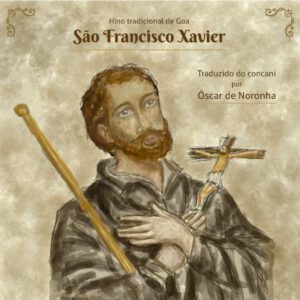
HINO TRADUZIDO A SÃO FRANCISCO XAVIER: VÍDEO E CORO
O icónico hino “Sam Fransiscu Xaviera”, em concanim de Goa, musicado há mais de um século por Raimundo Barreto (1837-1906), foi recentemente traduzido para português pelo nosso editor associado Óscar de Noronha (vide Revista da Casa de Goa, II, n.º 31, Set-Out 2024, pp 56-58). Esta é a primeira tradução da letra original do hino, que tem 11 estrofes. https://epaper.heraldgoa.in/article/oHeraldo?OrgId=112e47795a7&eid=0&imageview=0&standalone=1&device=desktop
Em 30 de novembro, o tradutor lançou uma gravação em estúdio da primeira e última estrofe do hino, no seu canal de YouTube https://youtu.be/GRYIB-Yp3lk?si=cy-8CPW4JqM8rU7R
A versão traduzida foi cantada publicamente, pela primeira vez, na missa em português que se realiza todos os anos no dia 1 de dezembro, por ocasião da novena de São Francisco Xavier em Velha Goa https://youtu.be/11Th2Kz_E8o , missa celebrada este ano por D. Tonito Francisco Xavier Muananoua, bispo auxiliar da arquidiocese de Maputo. O hino foi cantado pelo coro da Igreja de Nossa Senhora da Imaculada Conceição, de Pangim, a única igreja em Goa onde todos os domingos se celebra uma missa em português. https://www.gomantaktimes.com/news/goa/over-5000-attend-portuguese-mass-at-sfx-exposition-in-goa
Reconhecendo esse cântico como “o hino da comunidade católica goesa no país e no estrangeiro”, o jornal The Times of India afirmou que o novo vídeo tem recebido assinaláveis elogios nas redes sociais. Espera-se que também seja bem recebido pela diáspora goesa de língua portuguesa. https://timesofindia.indiatimes.com/city/goa/goencho-saibs-most-popular-hymn-gets-a-portuguese-tribute-at-old-goa/articleshow/115907224.cms
-o-o-o-

TRANSLATED HYMN TO ST FRANCIS XAVIER: VIDEO AND CHOIR
Goa’s iconic Konkani hymn “Sam Fransiscu Xaviera”, set to music over a century ago, by Raimundo Barreto (1837-1906), was recently translated into Portuguese by our associate editor Óscar de Noronha (see Revista da Casa de Goa, No. 31, Sep-Oct 2024, pp 56-58). This is the first-ever translation of the original lyrics of the hymn running into 11 stanzas. https://epaper.heraldgoa.in/article/oHeraldo?OrgId=112e47795a7&eid=0&imageview=0&standalone=1&device=desktop
On 30 November, the translator released a studio recording of the hymn’s first and last stanzas on his YouTube channel https://youtu.be/GRYIB-Yp3lk?si=cy-8CPW4JqM8rU7R
The translated version was sung publicly for the first time at the Mass in Portuguese that is held on 1 December every year on the occasion of the novena to St Francis Xavier at Old Goa https://youtu.be/11Th2Kz_E8o , which Mass this year was celebrated by D. Tonito Francisco Xavier Muananoua, auxiliary bishop of the archdiocese of Maputo. The hymn was sung by the choir of Our Lady of the Immaculate Conception Church, Panjim, the only church in Goa where a Mass in Portuguese is held every Sunday. https://www.gomantaktimes.com/news/goa/over-5000-attend-portuguese-mass-at-sfx-exposition-in-goa
Hailing the hymn, as ‘the anthem of the Goan Catholic community at home and abroad’, The Times of India stated that the new video has been garnering rich praise on social media. It will hopefully be welcomed by the Portuguese-speaking Goan Diaspora. https://timesofindia.indiatimes.com/city/goa/goencho-saibs-most-popular-hymn-gets-a-portuguese-tribute-at-old-goa/articleshow/115907224.cms
Salvos and Salvation
Even a glimmer of hope that the Gaza ceasefire will go into effect today seems to have instantly put the world at ease. But will the behind-the-scenes arm-twisting by the US President-elect really spell the end of the salvos? And whether or not the parties concerned will honour the deal, or how long they will do so, is just anybody’s guess.
Israel has always been a hard nut to crack. Ironically, the nation that comprised God’s Chosen People has long since been at loggerheads with Him. It is said that in the past God spoke to them through the prophets, but to no avail. Finally, two millennia ago He spoke to them by his Son, again in vain. The saving grace is that after this time the divine message was proclaimed to the world at large.
The First Reading (Is 62: 1-5) on this Second Sunday in Ordinary Time is witness to how God’s People, long exiled and suffering in Babylon, were not forsaken by Him. In fact, the Prophet Isaiah joyfully announces their impending salvation. God will not rest until ‘her vindication shines out like the dawn, her salvation like a blazing torch.’
The most shining image through it all is that of marriage. ‘As a young man marries a young woman, so will your builder marry you; as a bridegroom rejoices over his bride, so will your God rejoice over you.’ And to better define the love by which God wishes to restore His ties with his People, Isaiah picks up this key Scriptural theme of the marriage of God and Jerusalem.
Is it any wonder, then, that the first miracle that Jesus performed was at a marriage in Cana? While the Gospel (Jn 2: 1-11) describing this ‘sign’ (miracle) harks back to Isaiah, it also establishes Jesus as the Son of God and helps take forward His salvific plan. And Mary’s discreet participation is not to be missed. She not only suggested to her Son that His intervention was the need of the hour; she went ahead and created the right conditions by instructing the servants to do whatever He told them.
Here were two persons who cared and went out of their way to prove they cared. In human terms, this reaching out by Mother and Son was a sure way to win the people’s confidence and trust. But this was only the beginning, not an end in itself. The larger concern was the spiritual salvation of those people. The changing of the water into wine should have led the people to lose themselves in the Wonder Worker. But here again, Israel proved to be a hard nut to crack.
What about you and me? Do we firmly believe that Jesus is our personal and universal Saviour? That His Mother is Mediatrix and Co-Redemptrix? By becoming the ‘handmaid of the Lord’, she made possible the birth of the Son of God. And today we see her as catalyst in Her Son’s public life. At first, He seems to reject her suggestion but soon we see Him doing precisely what she had suggested. This not only goes to show how much Jesus valued His Mother but also how we must hold her in high esteem.
Finally, while Christ is the Bridegroom, none other than the Church is the Bride of Christ. And behold how the believers that comprise the Church are wedded together. The Second Reading (1 Cor: 12: 4-11) states that there is a diversity of ministries and operations but the same Lord and God.
Similarly, the Holy Spirit manifests Himself in us the believers through charisms: He gives to one the word of wisdom, to another, the word of knowledge, and similarly, faith, grace of healing, the working of miracles, prophecy, the discernment of spirits, the gift of tongues, interpretation of speeches, and so on, but all as per of that same Spirit.[1] Yet, these gifts are not meant for self-aggrandisement but to bring about our ultimate salvation.
A close-knit family of believers ought to be the apple of our eye. Family cohesion comes as fruit of a blessed marriage. God and His people together none can put asunder. And no matter how soon we see the end of the salvos, real salvation comes from God alone. He is our Spes Unica, our only hope!
[1] Operations, services and charisms refer to the same experience but are named differently as to be attributed to the Three Persons of the Holy Trinity.
Utopia ou distopia? | Utopia or dystopia?
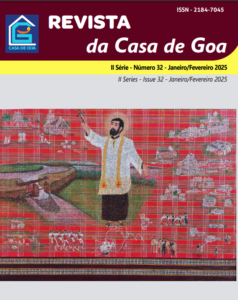
Editorial
Utopia ou distopia?
Sem que isso tivesse sido planeado, o presente número da nossa Revista lança um olhar crítico sobre o passado e o presente de Goa e abalança-se sobre o seu futuro.
Para começar, chamo à atenção ao ensaio intitulado ‘A história e a utopia da viagem’, em que Júlia Serra, depois de retratar Albuquerque e a sua arrojada viagem ao Oriente no século XV, refere-se a três viajantes modernos – o médico Lúcio Augusto da Silva, o jornalista Ernesto Várzea Jr. e Fernando Laidley, um apaixonado pelos automóveis – para quem a viagem de Lisboa a Goa e além, foi utopia, mas também “espaço-tempo de realidade e vivência pessoal”.
Nesse sentido, a figura máxima de viajante e sonhador, na melhor acepção da palavra, foi, sem dúvida, S. Francisco Xavier. Objecto de reflexão no nosso número anterior, é agora relembrado pelo jesuíta Délio Mendonça, que no seu artigo “Pegadas de Esperança” descreve a galeria de pintura goesa, patente na Velha Cidade de Goa por ocasião da Exposição das Sagradas Relíquias do Santo, na qual “uma caraterística comum marcante destas pinturas é a Goanização e a contextualização de Xavier”.
No âmbito da arte musical, noticiamos o vídeo e o cantar público do icónico hino em concanim, “Sam Fransiscu Xaviera”, recentemente traduzido para português pelo nosso editor associado Óscar de Noronha.
Na mesma esteira, a primeira prestação do ensaio em que é historiado o ‘Colonialismo português na Ásia’, o casal Gilbert e Philomena Lawrence não deixa de se referir ao Santo basco, que ficou “gravemente desiludido com o comportamento dos colonos”. Logo depois deixou Goa para trabalhar em territórios não lusitanos do Sul da Índia, Malásia e Japão.
Vê-se, pois, que Goa foi Utopia para um grande número de pessoas de todos os tempos. De entre os da contemporaneidade, V. M. (Nitant) Kenkre, em poema, recorda-se com saudade de “Goa da minha infância”, enquanto no seu ensaio trata mais especificamente das escolas de português que frequentou.
Nos mesmos moldes, Ralph de Sousa dedica-se ao porto de Mormugão, na segunda prestação da série de ensaios sobre as “Luzes dos portos e delícias marítimas”.
Da pena desse colaborador está em destaque o livro Change of Guard (Render da Guarda), ora em avaliação crítica de Heta Pandit.
Que a relação entre Goa e Portugal foi uma aventura multissecular fica comprovado não só pelas excelentes relações humanas entre os dois povos, como também, em particular, pelo seu roteiro gastronómico. É o caso do chacuti que, nas palavras do nosso editor associado José Filipe Monteiro, é “a iguaria mais genuinamente goesa”; e o qual, no conceito do prestigiado crítico Fernando Melo, está em casamento feliz com Casal da Coelheira Private Collection Alicante Bouschet tinto. Saboreiem-nos!
Tão depressa, como alimento para a mente, apresentamos, no Cantinho do Concani, a décima prestação de Adágios Goeses, selecionados do livro Enfiada de Anexins Goeses, de R. B. Barreto Miranda, e transcritos em concani moderno por Óscar de Noronha.
Como ímpar exemplo humano da sabedoria indo-portuguesa, é focada, pela pena de Mário Viegas, a personalidade polivalente de Indalêncio Froilano Pascoal de Mello.
Seria exagerado afirmar que tudo isso aponta para a Utopia que foi Goa, no decorrer dos tempos?
Por outro lado, temos a situação de Goa na actualidade. Ivo de Noronha, no ensaio intitulado “Empreendimentos de luxo em Goa: bênção ou maldição?”, questiona-se sobre o dinheiro que entra e a identidade que vai desaparecendo com a vaga de construções extravagantes em Goa… Oxalá que não seja isso um reflexo da profecia atribuída a S. Francisco Xavier: “Goa ninguém a levará; por si acabará”!
Noticiamos com um misto de sentimentos que o “Mapeamento da morte da floresta de manguezais” em Goa, fotografada por Payal Kakkar, venceu a medalha de prata no Tokyo International Photo Awards 2024. Congratulamo-nos pelo facto de essa situação ambiental suicida ter sido constatada por uma agência estrangeira.
Outra notícia na respectiva secção é a distinção de Abílio Fernandes com medalha de oiro que lhe foi atribuída pelo município de Évora, apreciando o facto de o centro histórico da cidade-museu ter sido elevado pela UNESCO ao estatuto de Património Mundial da Humanidade durante a presidência autárquica do homenageado há 38 anos.
Enquanto deixa um trilho de esperança a actividade cultural de grande relevância que a Fundação Oriente vem exercendo em Goa, como se vê pelo seu desempenho nos últimos dois meses, é muito aguardada a participação da apreciada fadista Cuca Roseta, no Festival do Monte 2025, que comemora os 30 anos dessa instituição em Goa.
Também as aguarelas de Girish Gujar (“Casa na Ilha de Divar”) e de Taniya Shetke (“Abundância divina”); as pinturas de Edgar João (“Murmúrios da Monção”), João Coutinho (“Mahakavi Camõis”), e Rouella Barreto (“A arte do fenim de caju”) são uma agradável brisa vinda dos mais pitorescos locais de Goa, muito embora a pintura de Chaitali Naik (“Festival dos Ladrões”), para não falar da caricatura (“O que resta para comemorar?”) do octogenário Alexyz, façam nascer um sorriso irónico nos nossos lábios.
No meio de tudo isso, em duas cartas ao director, comenta Júlia Serra, primeiro, sobre a reportagem televisiva intitulada “Goa, Coração Português”, da SIC Notícias, que passou em Portugal em novembro do ano próximo findo: “Goa entra nas casas portuguesas” é como intitula o seu apontamento. E logo depois, escreve sobre “Goa e as tradições portuguesas”, que veio a conhecer, através da Agência Lusa, que divulga a situação da língua e cultura portuguesa, e em particular como é celebrada a quadra natalícia em Goa. Dir-se-ia, por isso, que é o caso de Portugal ter entrado nas casas goesas!
Finalmente, o nosso editor associado Valentino Viegas expõe a prata da casa no relato que faz por ocasião do centésimo número da nossa Revista. E, em carta ao director, chama atenção à operação policial realizada na Praça Martim Moniz, em Lisboa, a qual, segundo diz, pôs em risco, “a bela imagem de Portugal multicultural e multirracial, difundida pelo mundo inteiro, a viver em harmonia, paz e sossego, que tanto nos custou a criar”.
Esperemos que Goa, a Aparant, e Lisboa, a Felicitas Julia – duas Utopias do passado – se mantenham fiéis aos seus gloriosos epítetos, e nunca se tornem distopias.
Capa: 'Fios de Goa' (pintura com seringa, acrilico em tela), de Clarice Vaz

Editorial
Utopia or dystopia?
Without any prior planning, the current issue of our magazine has taken a critical look at Goa’s past and present and looks at its future as well.
To start with, I would like to draw your attention to the essay entitled ‘History and the Utopia of Travel’, in which Júlia Serra, after portraying Albuquerque and his daring journey to the East in the 15th century, refers to three modern travellers – physician Lúcio Augusto da Silva; journalist Ernesto Várzea Jr. and car enthusiast Fernando Laidley – for whom the journey from Lisbon to Goa and beyond was a utopia, but also a ‘space-time of reality and personal experience’.
In this sense, St Francis Xavier was undoubtedly the ultimate traveller and dreamer, in the best sense of the word. He was the subject of reflection in our previous issue, and is now remembered by a fellow Jesuit, Délio Mendonça, who in his article ‘Footprints of Hope’ describes the gallery of Goan paintings on display in the Old City of Goa on the occasion of the Exposition of the Sacred Relics of the Saint, and in which ‘a striking common feature of these paintings is the Goanisation and contextualisation of Xavier’.
In the field of music, we report on the video and the public singing of the iconic hymn in Konkani, ‘Sam Fransiscu Xaviera’, recently translated into Portuguese by our associate editor Óscar de Noronha.
In the same vein, the first instalment of the essay on ‘Portugal’s Colonialism in Asia’, by Gilbert and Philomena Lawrence, does not fail to refer to the Basque saint, who was “gravely disappointed by the behaviour of the colonists”. Soon afterwards, he left Goa to work in non-Portuguese territories in South India, Malaysia and Japan.
Apparently, Goa has been Utopia for a large number of people throughout history. In contemporary times, V. M. (Nitant) Kenkre’s poem ‘Goa of my Childhood’ is a nostalgic recollection, while in his essay he deals more specifically with the Portuguese language schools he attended.
Likewise, Ralph de Sousa focuses on Mormugão Port, in the second instalment of a series of essays titled ‘Harbour Lights and Maritime Delights’.
The said writer’s book Change of Guard is critically reviewed here by Heta Pandit.
The fact that the relationship between Goa and Portugal has been an adventure across centuries is proven not only by the excellent human relations that exist between the two peoples, but, in particular, by their gastronomic journey. So is the case of xacuti which, in the words of our associate editor José Filipe Monteiro, is ‘the most genuinely Goan delicacy’; and which, in the prestigious critic Fernando Melo’s view, is happily paired with Casal da Coelheira Private Collection Alicante Bouschet red. Savour them!
Just as quickly, as food for thought, we present, in the Konkani Corner, the tenth instalment of Goan adages, culled from R. B. Barreto Miranda’s book Enfiada de Anexins Goeses and transcribed into modern Konkani by Óscar de Noronha.
As a unique human example of Indo-Portuguese wisdom, Mário Viegas focuses on the versatile personality of Indalêncio Froilano Pascoal de Mello.
Would it then be an exaggeration to say that all of this points to the Utopia that was Goa down the ages?
On the other hand, we have Goa’s situation today. Ivo de Noronha, in his essay titled ‘Luxury developments in Goa: a boon or a curse?’ wonders about the money being earned and the identity being lost with the wave of extravagant constructions in Goa... Let’s hope that this isn’t a telltale sign of a prophecy attributed to St Francis Xavier: “None will take away Goa; it will end by itself”!
We announce with mixed feelings that ‘Mapping the death of mangrove forest’ in Goa, photographed by Payal Kakkar, was awarded a silver medal at the Tokyo International Photo Awards 2024. We are pleased to note that the said suicidal environmental situation has been acknowledged by a foreign agency.
Another news item in the respective section is the municipality of Évora’s award of a gold medal to Abílio Fernandes, in appreciation of the fact that UNESCO elevated the historic museum-city to World Heritage status during his mayorship, thirty-eight years ago.
While the hugely relevant cultural activity that Fundação Oriente has been carrying out in Goa, as seen from its report of the last two months, leaves a trail of hope, the presence of the acclaimed fado singer Cuca Roseta in the forthcoming Monte Festival, on the 30th anniversary of the Foundation’s Goa Delegation, is something to look forward to.
Watercolours by Girish Gujar (‘House on the Island of Divar’) and Taniya Shetke (‘Divine Abundance’); paintings by Edgar João (‘Monsoon Murmurs’), João Coutinho (‘Mahakavi Camõis’), and Rouella Barreto (‘The Art of Cashew Feni’) are like a pleasant breeze from Goa’s most picturesque locations, even while Chaitali Naik’s painting (‘Festival of Thieves’), not to mention octogenarian Alexyz’s cartoon (‘What is left to celebrate?’), bring an ironic smile to our lips.
In the midst of it all, by way of two letters to the director, Júlia Serra comments, firstly, on SIC Notícias’ TV report titled ‘Goa, Coração Português’ (Goa, a Portuguese Heart), which aired in Portugal in November last year: ‘Goa enters Portuguese homes’ is how she titles her note. Soon thereafter she writes about ‘Goa and Portuguese traditions’, which she learnt about from Lusa News Agency’s report on the status of Portuguese language and culture, and in particular the celebration of Christmas in Goa. One may note, conversely, that Portugal has entered Goan homes!
Finally, our associate editor Valentino Viegas showcases the family silver in his piece marking the 100th issue of our magazine. And in a letter to the director, he draws attention to the police operation that happened in Lisbon’s Martim Moniz Square, which, he says, jeopardized ‘the beautiful image of multicultural and multiracial Portugal, spread across the world and living in harmony, peace and quiet, all of which we have worked so hard to create’.
Let’s hope that Goa, the Aparant, and Lisbon, the Felicitas Julia – two Utopias of the past – remain true to their glorious epithets and never turn into dystopias.
Cover: 'Goan Threads' (syringe painting, acrylic on canvas), by Clarice Vaz
Christ’s unmistakable divinity
All three Readings of Sunday after Epiphany underline the divinity and mission of the One born in Bethlehem. After all, that is what Epiphany was meant to be: a manifestation of Christ to the Gentiles as represented by the Magi. It was also the manifestation of divinity at His Baptism in the River Jordan, and finally at His first miracle, at Cana in Galilee.
January 6 (and now the Sunday close to it) is commemorated as the day the Magi visited the Infant Jesus. And today we commemorate His Baptism at the hands of His forerunner cousin, John, as recounted in the Gospel (Mt 3: 13-17). But what is the rationale behind a prophet baptising the Son of God, the Messiah?
Truly, John was hesitant but Jesus said, ‘Let it be so now; for thus it is fitting for us to fulfil all righteousness.’ ‘Righteousness’ or ‘justice’ is the new fidelity, a total obedience to the will of God. For His part, Jesus wished to express His solidarity with sinners, through baptism. He showed how His mission was a far cry from the Judaic dream of a proud and triumphant Messiah.
Realising what Jesus meant, John the Baptist consented to baptise Jesus. As a fitting endorsement of this act, the heavens open and the Spirit of God descend upon Jesus like a dove. And, lo and behold, a voice from heaven says, ‘This is My beloved Son, with whom I am well pleased.’ The bystanders must have been in awe and got goosebumps. What better confirmation could the Jews, then, expect before they accepted Jesus as the Messiah?
The First Reading (Is 42: 1-4, 6-7) prefigures the Gospel passage of today. We hear similar words from what is called the First Song of the Servant, making the hair stand on end. The Book of Isaiah has four oracles or poems on the Servant of Jehovah. It is not easy to identify this figure: was he the prophet himself? Or the historical Israel? Or the ideal Israel? Well, the New Testament identifies the Servant with Jesus Christ, linking especially the last oracle with His Passion.
Meanwhile, here are those words echoed at the Baptism of Jesus: ‘Behold my servant whom I uphold, my chosen, in whom my soul delights; I have put my Spirit upon him, he will bring forth justice to the nations.’
What follows is a picture of Our Lord meek and humble of heart, He who died for our sins. Finally, words expressing His mission on earth: ‘I have given you as a covenant to the people, a light to the nations, to open the eyes that are blind, to bring out the prisoners from the dungeon, from the prison those who sit in darkness.’
Indeed, Jesus was the mediator of the New Covenant; He was a light by the love, compassion and hope He offered to the nations; He cured the blind, the deaf, the mute and the lame, and brought many people back to life; finally, in our times, He has liberated you and me from physical, emotional, psychological and spiritual captivity.
Finally, in the Second Reading (Acts 10: 34-38), St Peter[1] is at the house of Cornelius the Roman centurion (considered the first gentile to convert to the Christian faith) when he vouches for his Divine Master. Peter states that after Baptism, the name of Jesus was made known throughout Judea, beginning from Galilee. Now anointed with the Holy Spirit and with power, Jesus went about doing good and healing those oppressed by the devil.
Since Jesus is the Light of the World and meant to be proclaimed to the ends of the earth, St Peter makes it clear right away that God is supranational. He does not care for earthly divisions of nations, societies, or any other. Any person is pleasing to Him and the Heavenly Father, not by their purity or impurity but by their fear of God and His justice.
By baptism, our sins are forgiven and our souls are infused with the life of God. We become children of that One True God. Like the first group of pagans who at Cornelius’ house were awed by the Good News of Salvation and broke their ties with their Jewish past by receiving baptism, may we too appreciate the fruits of the Holy Spirit and use our gifts to spread the Good News.
Banner: https://shorturl.at/3TKk0
[1] In St Luke’s Acts of the Apostles, St Peter is the primary protagonist through chapters 3-12 and the Apostle Paul through chapters 9-28.
Privileged to be part of God’s Family
Today, Sunday in the Octave of Christmas, marks the Feast of the Holy Family. In India, the Lectionary offers Readings for the Years A, B and C, as follows:
| Year | First Reading | Psalm | Second Reading | Gospel |
| A | Eccl 3: 2-6, 12-14 | Ps 127: 1-2, 3, 4-5 | Col 3: 12-21 | Mt 2: 13-15, 19-23 |
| B | Gen 15: 1-5, 21: 1-3 | Ps 104: 1-6, 8-9 | Heb 11: 8, 11-12, 17-19 | Lk 2: 22-40 |
| C | 1 Sam 1: 20-22, 24-28 | Ps 83: 2-3, 5-6, 9-10 | 1 Jn 3: 1-2, 21-24 | Lk 2: 41-52 |
However, in Years B and C, there is an option to use the Readings of Year A instead.
For reflections on the Readings of Year A, see https://www.oscardenoronha.com/2023/12/31/gazing-admiringly-at-nazareth/; and for Year B, see https://www.oscardenoronha.com/2023/01/01/under-two-holy-names/
-o-o-o-
Proceeding to the Readings assigned for Year C, we must note their aptness and correlation.
In the First Reading (1 Sam 1: 20-22, 24-28), Hannah[1] is one of two wives of Elkanah. Hannah was childless, whereas his second wife Peninnah bore him children; yet he had a soft spot for Hannah. Her status as first wife and her barrenness are reminiscent of Sarah (Gen 17) and Rebecca (Gen 25).
One day Hannah went up to the Tabernacle[2] and wept as she prayed. She asked God for a son and vowed to give him back for the service of God. She knew that being childless implied that one did not enjoy God’s favour; and bearing a male child would set her up in the community.
Finally, Hannah conceived and bore a son, whom she named Samuel (meaning, ‘Heard by God’). She raised him until he was weaned and brought him to the temple along with a sacrifice. There she made him over to the Lord for the whole of his life – something that will prompt moderns to question her wisdom. The fact is that, as a prophetess in her own right, she had discerned God’s will. Samuel was happy and fulfilled where he was planted – ‘How lovely is your dwelling place, Lord, God of hosts,’ says the Psalm today, doesn’t it? He became a priest and a man of great faith, Israel's last judge and first of the later prophets.
Hannah has a prayer of thanksgiving to God for the birth of Samuel; it’s called the Song of Hannah. It found an echo in the Magnificat that the Blessed Virgin Mary sang upon visiting her cousin Elizabeth. Hannah, Mary, and Elizabeth became pregnant in miraculous ways and dedicated their sons (Samuel, Jesus, and John the Baptist) to God’s service. And for those who may wonder how Hannah could be so self-sacrificing, the fact is God pays us back a thousandfold. Accordingly, Eli announced another blessing on Hannah, and she conceived three more sons and two daughters.
On this Feast of the Holy Family, the Gospel too could perplex the modern mind. When the parents of Jesus were returning from Jerusalem after the feast of the Passover, Jesus stayed behind in the temple. His parents did not know it; they then searched for Him in the city and found Him after three days. On hearing of how anxious they had been, Jesus retorted: ‘Did you not know that I must be in my Father’s house?’ Yes, seated among the teachers, He had amazed them with his knowledge and insightful answers.
Parents today suffer from greater anxiety than Jesus' parents did. Yet, their anxiety is only about how their children will fare in this world, not in the next. In stark contrast, even while Jesus displayed independence of mind, the parents of Jesus were satisfied with their Son’s answer – because His concern was with being in His Father’s house, where He truly belonged. It was not stubbornness. He had made His point, and was now obedient and submissive to His earthly parents. What a fine balance! Then, there comes, what is to me, one of the most beautiful passages in the Scriptures: ‘Jesus increased in wisdom and in stature, and in favour with God and men’, while His mother ‘kept all these things in her heart.’
Between the First and the Third Readings, we clearly have a preannouncement and its fulfilment, a forerunner and the actual Messiah. And what place do you and I have in the divine economy? In the Second Reading (1 Jn 3: 1-2, 21-24), St John[3] states, ‘We are called God’s children, and that is what we are.’ Indeed, by our baptism we have become God’s children, unlike others who, though also loved by God, are His creatures.
Noblesse oblige: privilege entails responsibility. Hence, our life as children of God ought to be radically different from that of unbelievers. We must live in a way that pleases our Father in Heaven; we must live a life of selfless love. If we ‘think of the love that the Father has lavished on us, by letting us be called God’s children’, we will never be discouraged when the world rejects us. The world rejects us as once they rejected Jesus. What a privilege to be in His company!
At the same time, we are not to rest on our laurels; ‘what we are to be in the future has not yet been revealed; all we know is that when it is revealed we shall be like Him because we shall see Him as He really is.’ So, we must pray for blessings and graces and earn our place in Heaven. And to ensure that this happens, we must keep the Father’s Commandments and live the kind of life that He wants us to live. His commandments are simple: that we believe in the name of His Son, Jesus Christ, and that we love one another as He has loved us. This will set an example to our immediate human families. Fortunately, we have the Holy Family of Nazareth for our model of family life, human relations and community life – all of which lets us partake of God’s family.
[1] She finds mention only in the first two chapters of the first Book of Samuel.
[2] In Jewish history, the Tabernacle (meaning, ‘dwelling’) refers to the portable sanctuary constructed by Moses as a place of worship for the Hebrew tribes during the period of wandering that preceded their arrival in the Promised Land. The Tabernacle became redundant after the construction of Solomon's Temple in Jerusalem in 950 BC.
[3] St John is the author of the Gospel of John and four other books of the New Testament – the three Epistles of John and the Book of Revelation.
The Light of Love
Three short Readings fills us with eager anticipation for Christmas.
On this Fourth Sunday of Advent, Micah’s words create the atmosphere. Micah (aka Micheas) is one of the Twelve Minor Prophets, a contemporary of Isaiah, Amos and Hosea. He castigated Jerusalem for her sin of idolatry would lead to her fall. He also prophesied her recovery and the restoration of the Judean state.
The First Reading of today (Mic 5:2) is a key passage in that regard. Micah honours Bethlehem, a small village south of Jerusalem, as the future birthplace of the Messiah: ‘You, O Bethlehem Ephrathah,[1] who are little to be among the clans of Judah, from you shall come forth for me one who is to be ruler in Israel, whose origin is from of old.’ This provides the convincing proof that Jesus is God!
The Gospel text (Lk 1: 39-45) endorses the fact that Jesus is God. ‘When Elizabeth heard the greeting of Mary, the babe leaped in her womb; and Elizabeth was filled with the Holy Spirit and she exclaimed with a loud cry, Blessed are you among women, and blessed in the fruit of your womb!’ Further, Elizabeth refers to her cousin as ‘the mother of my Lord’, who was ‘blessed’ for believing that there would a fulfilment of what was spoken to her by the Lord.
And what manner of man would the babe of Bethlehem grow up to be? The Second Reading (Heb. 10: 5-10) defines him: he would despise sacrifices and offerings and offer Himself as a holy sacrifice once for all. Seldom do we realise that the gentle spirit of the Nativity prepares the way for the drama of the Cross and the Paschal victory.
That Supreme Sacrifice speaks volumes of God’s love for humankind. We are called to live in the light of that ineffable love.
[1] Ephrathah, to distinguish this town from another called Bethlehem.
